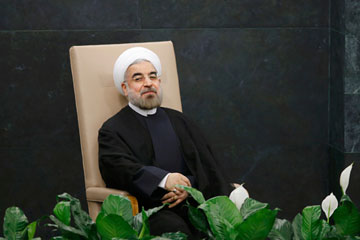
Iranian President Hassan Rouhani waits to address the U.N. General Assembly.
(3 of 4)
And he clearly knows what the West needs to hear. In a Sept. 20 Washington Post op-ed, Rouhani said he wants "constructive engagement" in a "changed" world in which "cooperation and competition often occur simultaneously." He has tweeted Jewish New Year's greetings to all Jews--something it's hard to imagine the Holocaust-denying Ahmadinejad ever doing--and released a dozen political prisoners. "There's something really interesting going on here," says Kenneth Pollack of the Brookings Institution and author of Unthinkable: Iran, the Bomb, and American Strategy. "We shouldn't dismiss this as just words."
Obama thought so too. The American President has plenty of reasons to want a deal. Foremost is his intense desire to avoid further military action in the Middle East--something clear from his tortured response to Syria's recent use of chemical weapons--despite his repeated vows to bomb Iran if necessary. There's also the alluring prospect of Iranian cooperation on headaches like Syria, where elements of Tehran's Revolutionary Guards Corps and its Lebanese proxy, Hizballah, are fighting alongside dictator Bashar Assad. And then there's the matter of Obama's legacy. Handing off Iran as an unresolved problem to his successor would amount to failure on one of his central responsibilities. A grand bargain, particularly one enabled by his stricter sanctions policy, could be a legacy-shaping triumph. "It is one of the few tangible opportunities the Obama Administration has to leave a positive diplomatic legacy in the Middle East," says Karim Sadjadpour of the Carnegie Endowment for International Peace.
But beneath the soothing words coming from Tehran are some political realities that may not have changed much since the Ahmadinejad era. Hard-liners still hold great power in Iran, particularly in the country's Islamic Revolutionary Guards Corps. And the real leader of Iran is not Rouhani but Supreme Leader Khamenei, whose worldview remains fundamentally hostile to the West. Just as conservatives warned Khatami in 2000 not to get too close to Clinton, Rouhani may have received a similar message on Sept. 24. "Shaking hands with Obama would have won Rouhani huge points with the Iranian public, but it would have caused Iran's hard-liners to have a conniption," says Sadjadpour. "The Islamic Republic's identity has long been premised on resistance against American hegemony. After three decades of presiding over crowds chanting 'Death to America,' a fundamental strategic shift is incredibly dangerous for Khamenei."
Nuclear Nitty-Gritty
Of course, real progress will require far more than stagecraft. The two Presidents have already exchanged secret letters expressing a desire to talk. And they have empowered their top diplomats--namely Secretary of State John Kerry and Iran's Foreign Minister Mohammed Javad Zarif--to do so. "Let's get to those negotiations," says Hooman Majd, an Iranian-American commentator. "Let's get to the nitty-gritty." The next round of formal nuclear talks between Iran and the U.S., Russia, China, Britain, France and Germany will resume in Geneva in October.
